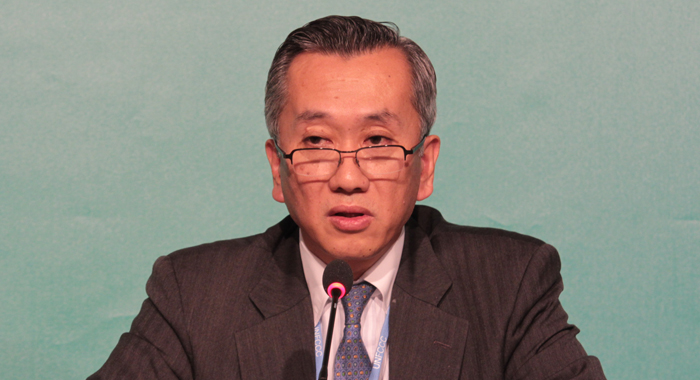
By Kenton X. Chance
WARSAW, Poland — A Caribbean climate talks negotiator is questioning Japan’s intention in announcing on Wednesday US$16 billion in aid to developing countries, less than one week after it announced a reduction in its carbon emissions target
In his statement to the high level segment of the talks on Wednesday, Nobuteru Ishihara, Japan’s Minister of the Environment, announced that Tokyo will “provide support to developing countries” totalling 1.6 trillion yen, about US$16 billion from 2013 to 2015.
“We will mobilize official development assistance, other official flows, and private finance in the field of mitigation and adaptation,” Ishihara further said.
The announcement came in the wake of the shocking announcement by Tokyo last Friday that it was decreasing its carbon emissions target.
The initial goal was to achieve a 2020 target of 3.8 per cent below 2005 levels, but Tokyo said it would reduce emissions by 25 per cent from 1990 levels.
Tokyo said that the revision was necessary as a result of the Fukushima nuclear meltdown, but environmental activists dismissed this as merely an excuse.
Hiroshi Minami, Japan’s Ambassador for Civil Society and Deputy Director-General of Global Issues at the Ministry of Foreign Affairs, told a press conference Wednesday that this is a voluntary commitment and Japan is willing to provide climate finance, but will not ask other developed countries to make similar commitments.
Developed countries have agreed to scale up to US$100 billion a year their contribution to financing for climate change mitigation and adaptation projects and programmes.
But the Caribbean negotiator, who asked not to be identified, questioned whether the U$16 billion is separate from the development aid that Japan normally gives.
“Is it over and above official development assistance (ODA)?” the Caribbean negotiator said, noting that developed countries had agreed to contribute 0.7 per cent of their GDP to developing nations.
“If so, let’s thank the Japanese for their generosity,” the negotiator said, adding that the money is intending to placate developing countries after their strong condemnation of the revised target.
Asked how the US$16 billion is to be distributed and whether any had been earmarked for Caribbean nations, Minami said that of the US$16 billion, US$3 billion will be provided from private finance, and the rest will be provided by public finance.
He, however, said the composition of the US$13 billion is yet to be decided and the government will work on it in the coming month.
He said that the money will focus on disaster risk reduction and utilise new scheme, for example Stand-by Emergency Credit for Urgent Recovery (SECURE), and promote the substantial scale-up of private climate finance by utilising public financial instruments.
He further said that an agreement on loss and damage as a consequence of climate change was mandated from last year’s talks and that Japan would want a tangible and practical outcome on that.
He said that while negotiators are working hard towards a consensual pact, they were yet to reach an agreement.
The 19th Conference of the Parties to the United Nations Framework Convention on Climate Change (UNFCCC COP 19) and the 9th Session of the Conference of Parties serving as the Meeting of the Parties to the Kyoto Protocol (CMP 9) are being held here from November 11 to 22.





